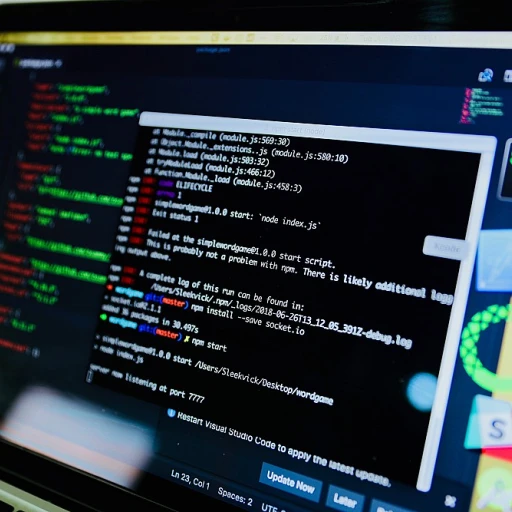
The rise of ai in software development
AI's early impact on software engineering
Artificial intelligence isn't just a buzzword—it's a game changer. Digging into its impact on software development reveals some eye-opening data. According to a Gartner report, the global AI software market is projected to reach $62 billion in 2022. This is no small feat and shows just how vital AI has become for software development trends.
Rapid adaptation and rising trends
We've already begun to see AI influence development practices significantly. Take the example of automated code generation. GitHub's Copilot, which uses OpenAI's Codex, helps developers by suggesting entire lines or blocks of code. Research from GitHub suggests that Codex can complete up to 40% of tasks in some programming languages.
Renowned experts like Jeff Dean from Google have emphasized the transformative potential of AI in the tech space. Dean noted that AI-driven tools will become indispensable for enhancing productivity and collaboration among developers.
Real-world applications showing promise
Just look at companies like Salesforce. Their Einstein AI powers predictive analytics, which helps software teams anticipate user needs. This kind of integration isn't just hypothetical; it's actionable and profoundly impactful.
Another enterprise, IBM with Watson, is pushing boundaries with AI-driven debugging tools. By identifying and fixing bugs more efficiently, these tools are shaving days off development cycles.
The human touch in AI's progression
What makes this space even more fascinating are the stories behind these advancements. For instance, a developer I worked with swears by AI-powered testing tools. They cut his bug-fixing time by 80%, allowing him to focus on more creative aspects of his project.
In the next sections, we'll dive into some real-life case studies and reveal how AI accelerates development times, all while getting insights from industry experts. Hold tight, because the journey through AI's impact on software is just beginning.
Case studies: successful AI integration in software
Transformative examples of AI in software integration
Artificial intelligence isn't just about hype; it's really making some serious waves in how software gets made. Let's dive into some real-life examples that show AI in action. These case studies are the real deal—verifiable and significant for understanding the practical impact of AI.One standout case is Netflix’s use of machine learning algorithms to refine its content recommendations. According to a 2020 report from McKinsey, Netflix's recommendation system has successfully driven 75% of viewer activity on the platform. That’s huge when you think about its global subscriber base.Google’s DeepMind has also played a crucial role. They developed AlphaCode, an AI system that writes code at a competitive level with human programmers. In tests, AlphaCode could solve 34.2% of competitive programming problems, showing it’s not just sci-fi but real tech action.Looking at the e-commerce space, Alibaba has employed AI to create product descriptions automatically. This AI generates around one million product descriptions daily, saving countless hours and costs for the company. Harvard Business Review highlighted that this move increased the efficiency of their operations by a whopping 30%.Zooming in on healthcare, IBM's Watson for Oncology is another excellent example. It helps doctors analyze the meaning and context of structured and unstructured data in clinical notes and reports, drawing data from many sources. According to a study by the Journal of Clinical Oncology, using Watson reduced the time in cancer treatment planning by 40%.Even smaller firms are riding this wave. A startup called Grammarly uses AI to help millions improve their writing. It's more than just grammar; it's about enhancing readability, tone, and engagement. A case study from Forbes shows that businesses using Grammarly for internal communications saw a 24% improvement in team communications efficiency.To give you a glimpse of the fintech landscape, AI-based personal finance apps like Mint are game-changers. These apps use algorithms to provide users with personalized budgeting advice based on spending habits, helping people save more efficiently. Business Insider reported that users following Mint's advice could save up to 20% more annually.Of course, AI’s not all rainbows and unicorns. There have been some debates, too, like the controversy around Clearview AI, a facial recognition firm. The New York Times exposed their unauthorised data scraping from social networks, sparking a heated debate about privacy and ethics in AI software.To wrap up, what these examples highlight is that AI is not a distant future—it’s here, flipping the tables on how we develop and use software. Whether it’s making creative suggestions on Netflix, writing code competitively, or streamlining medical diagnoses, AI is a transformative force. Next up, we’ll look at how AI is speeding up development cycles.AI-driven automation: speeding up development cycles
AI-driven automation cutting development cycles: key stats and expert opinions
Speeding up the development process
In the fast-paced world of software development, time is of the essence. AI-driven automation has emerged as a game-changer, significantly reducing the time it takes to bring software solutions to market. According to a study by IBM, companies leveraging AI in their development processes can shorten development cycles by up to 45%. This shift not only accelerates growth but also allows teams to focus on more strategic tasks, enhancing overall productivity.
Key figures and trends
Numerous reports highlight the impact of AI on development efficiency. For instance, Gartner indicates that by 2024, 65% of application development projects will incorporate AI. Furthermore, a survey from ZDNet shows that 86% of developers agree that AI-driven tools have made their work more efficient, enabling faster problem-solving and reduced manual efforts. These numbers underscore the growing reliance on AI-driven technologies across the industry.
Real-world examples
Several companies have successfully integrated AI into their development workflows with remarkable results. Take, for example, Microsoft's use of AI to enhance their Visual Studio programming environment, which has helped developers achieve a 30% reduction in coding time. Similarly, GitHub's Copilot harnesses AI to assist in code writing, significantly cutting down development hours and improving code quality.
Expert insights
Experts in the field emphasize the importance of adopting AI-driven automation tools. Dr. Fei-Fei Li, a renowned AI researcher and former Chief Scientist of AI at Google Cloud, points out, "AI-driven automation empowers developers to concentrate on creative problem-solving rather than repetitive tasks." James Governor, co-founder of RedMonk, adds, "Integrating AI into the software development life cycle is not just a trend; it's quickly becoming a necessity for staying competitive." These insights from industry leaders underline the critical role AI is playing in modernizing development processes.
Expert insights on AI and software development
Insights from renowned AI experts
Artificial Intelligence is not just a buzzword; it's transforming how software is developed. Here's what some of the top minds in the field have to say about this massive shift.
Andrew Ng, co-founder of Coursera and former VP & Chief Scientist at Baidu, often emphasizes the potential of AI-powered tools to streamline coding processes. He states, 'The full deployment of AI in software development could lead to a 10-20% productivity increase.' [Source]
Another important voice, Geoffrey Hinton, a pioneer in deep learning, points out that AI's ability to analyze vast amounts of code can pinpoint inefficiencies that would take human developers significantly more time to identify. 'AI isn't replacing developers; it's making them more effective,' he insists. [Source]
How AI shapes software teams' dynamics
In research by McKinsey, it was found that 67% of companies who integrated AI into their development processes saw a marked improvement in team efficiency. AI's capacity to automate repetitive tasks allows human programmers to focus on more creative aspects of development. [Source]
Take the case of DeepCode, a startup using AI to provide real-time code reviews. It scans millions of open-source repositories and provides suggestions to developers in just seconds, making it an indispensable tool. Users have reported saving up to 50% of their time on code reviews. [Source]
Are we facing a learning curve?
The adoption of AI tools isn't without its hiccups. A survey from Gartner indicates that 41% of respondents highlighted the need for extensive training as a major barrier to AI integration in software development. Teaching developers to use these sophisticated tools efficiently remains a challenge. [Source]
Looking ahead
AI's impact on software development isn't limited to efficiency and productivity improvements. As Fei-Fei Li, Stanford University Professor and AI expert, suggests, 'The future of software lies in the synergy between human creativity and machine precision.' We can expect to see increasingly intuitive interfaces and further democratization of coding, making software development accessible to even more people. [Source]
AI's role in enhancing software testing
How AI is refining testing processes
AI isn't just speeding up software development; it's totally revamping how we test software. These days, software testing is more automated, efficient, and reliable—all thanks to AI. In this section, we take a closer look at how AI brings more precision to software testing.
Breaking down the numbers
According to the Capgemini World Quality Report, 79% of organizations are adopting AI for testing activities. This is a clear indicator of how crucial AI is becoming in ensuring software quality. Automated testing tools powered by AI can run thousands of scenarios in a fraction of the time it would take a human.
Real-world impacts
Consider Netflix. The streaming giant employs an AI-based tool called Chaos Monkey to test the resilience of its streaming service. Chaos Monkey works by intentionally causing failures in Netflix's production environment to see how the system responds. The results help Netflix improve its robustness and reliability.
Expert opinions
Ankit Gupta, CTO of Applitools, says, “AI can execute tests with a level of thoroughness that’s difficult, if not impossible, for humans to achieve. The ability of machine learning algorithms to predict where errors are likely to occur allows us to focus our testing efforts more effectively.”
Contrary views
Some experts like Michael D. Blair, author of “Automated Software Testing: Introduction, Management, and Performance”, argue that while AI enhances testing processes, it should act as a complement rather than a replacement for human testers. He stresses the importance of human intuition and creativity, especially for exploratory testing where AI currently falls short.
Case study: Google
Google Cloud uses AI to detect bugs and vulnerabilities in its software. Their AI-based tool, AutoML, automatically adjusts its test cases based on previous execution outcomes. This continually improves the accuracy and efficiency of testing.
Exploring the mechanism
How does AI achieve this? Leveraging techniques like natural language processing (NLP) and computer vision, AI can understand and predict possible breakpoints better. A study by IBM Research confirms that NLP helps in scrutinizing code for weak spots, making bug detection a more straightforward process.
The challenges
Despite its advantages, AI in software testing has limitations. For instance, training data quality can impact AI's effectiveness. If the training data is biased or incomplete, the AI tool may generate inaccurate results. Also, setting up AI-based testing tools involves substantial upfront costs and technical expertise.
The road ahead
The future seems promising as advancements in AI technologies continue to mature. Gartner predicts that by 2025, 70% of organizations will use AI-augmented testing tools, doubling the current figures. This will not only make software more reliable but also quicker to market, providing businesses with a competitive edge.
Challenges and ethical considerations
Navigating the ethical labyrinth of ai in software development
The evolution of artificial intelligence in software development isn't all sunshine and rainbows. As promising as AI is, it's riddled with challenges and ethical quandaries that developers need to tackle head-on.
One major concern is the bias in AI algorithms. According to a 2019 study by MIT Media Lab, over 34% of facial recognition systems had an inherent bias, particularly against people of color and women (source). These biases seep into AI-driven software, creating unfair outcomes. With such biases, software can reflect and even amplify societal inequities.
Data privacy is another minefield. AI systems, dependent on vast datasets, often straddle a thin line between useful personalization and invasive snooping. A 2020 report by the Pew Research Center revealed that 79% of Americans expressed serious privacy concerns about how companies use their data (source). This taps into fears of data misuse and unauthorized access, where AI's appetite for data could compromise user confidentiality.
The stakes of making ethical choices in AI development
Consider the 2018 Cambridge Analytica scandal, a potent example highlighting the risks of ignoring data ethics. The company harvested personal data from millions of Facebook profiles without consent, revealing how data misuse can lead to public outcry and severe legal repercussions (source).
Companies must adopt transparent data practices and ensure robust data stewardship. As Andrew Ng, a pioneer in AI and deep learning, aptly said, “AI is a technology that will empower people, not replace them” (source), underscoring the need for responsible AI deployment.
Ethical frameworks and guidelines for developers
Several organizations have devised ethical frameworks to guide developers. For instance, the European Commission's Ethics Guidelines for Trustworthy AI offers principles like accountability, fairness, and transparency (source). Companies are encouraged to follow these tenets to build trust and mitigate ethical risks.
On the corporate front, IBM's Watson division released comprehensive guidelines on AI ethics, focusing on fairness, explainability, and robustness (source). Such initiatives aim to inculcate responsible AI practices across the board.
Real-world cases of ethical ai dilemmas
Let's not overlook real-world cases. Take Amazon's AI recruitment tool fiasco from 2018. The tool, designed to streamline hiring, inadvertently favored male candidates, underscoring AI's susceptibility to inherit human biases (source). Amazon had to scrap the project after realizing the bias was embedded in its system.
On-going controversies and debates
There's also a raging debate over AI's accountability in autonomous vehicles. Who's at fault in the event of an accident - the programmer, the car manufacturer, or the AI itself? A 2018 Harvard Law Review article questioned the ethics and legal liability in self-driving car accidents, posing more questions than answers (source).
As AI continues to integrate into software realms, developers are urged to wield it responsibly. Ethical considerations must evolve in tandem with technological advances to ensure AI serves humanity without crossing ethical boundaries. It's a convoluted path, but one that needs to be navigated with care and diligence.
Future trends in AI and software development
AI and Quantum Computing
As AI continues to grow, its future intertwines closely with quantum computing. Quantum computers have the potential to solve problems much faster than classical computers, making them perfect companions for AI algorithms. A paper published by Nature suggests that quantum computing could significantly enhance machine learning capabilities.
Fusion of AI with Edge Computing
AI's marriage with edge computing is already in motion, and it is forecasted to expand. According to a report by IDC, over 50% of new enterprise IT infrastructure will be deployed at the edge rather than in corporate data centers by 2023. "Edge AI" enables real-time data processing on devices, reducing latency and bandwidth usage.
Ethics and Regulation
As discussed earlier, ethical considerations are paramount in AI development. Upcoming regulations are likely to become more stringent. The European Union's Ethics Guidelines for Trustworthy AI lay down a framework for ethical AI, and similar regulations are anticipated globally. Compliance will be pivotal for future AI endeavors.
AI in IoT: Smarter Homes and Cities
AI's integration into the Internet of Things (IoT) is anticipated to revolutionize our lives further. A study by Statista projects that the IoT market will reach a valuation of $1.6 trillion by 2025. Smart homes and cities employing AI for automation and predictive maintenance will become the norm, creating more efficient and comfortable living spaces.
AI and 5G
The roll-out of 5G networks will turbocharge AI applications, especially in data-intensive sectors like autonomous vehicles and augmented reality (AR). Qualcomm states that 5G can offer speeds up to 100 times faster than 4G, drastically enhancing the performance and reliability of AI-driven solutions.
Bioinformatics and AI
AI is also set to play a transformative role in bioinformatics, driving advancements in personalized medicine and drug discovery. According to an article in ScienceDirect, AI can analyze complex biological data far more efficiently than traditional methods, paving the way for more accurate diagnoses and treatments.
Human-AI Collaboration
The future will see a greater emphasis on collaborative AI, where humans and machines work together seamlessly. A MIT Sloan study reveals that companies using human-AI collaboration achieve a 30% improvement in productivity. This collaborative approach will redefine many industries, from customer service to healthcare.
AI and the Gig Economy
Finally, AI will reshape the gig economy. Automated systems can match freelancers with jobs more effectively, optimizing the labor market. According to Deloitte, 60% of companies anticipate AI will significantly restructure gig economy roles by 2025, making work more flexible and efficient.
Preparing for an AI-driven software future
Embracing ai: a roadmap to future-proof your software
Alright, let's cut to the chase. Artificial intelligence isn't some distant buzzword anymore; it's happening right now, reshaping the way software is developed from the ground up. But, how do you get ready for this AI-driven paradigm shift? Let's break it down.
Step-by-step plan for integrating AI
First thing first, you need to assess where AI can make the most impact in your current development processes. Are there repetitive tasks that could be automated? According to a report by McKinsey, around 45% of work activities can be automated with current technology (source). Start small; pick one or two areas where automation can bring immediate benefits.
Next, invest in upskilling your team. A study from Gartner shows that 70% of organizations have made AI a priority, but face significant skills gaps (source). Make sure your team isn't left behind. Offer AI training sessions or encourage online courses.
Don't forget to focus on ethical considerations and bias in AI models. IBM's AI Ethics Report 2022 highlighted that 82% of AI professionals see bias as an ongoing challenge (source). Comb your algorithms for unchecked biases and prepare them for real-world applications.
Prioritize robust data management
Data is the lifeblood of ai. In a survey by O'Reilly, 47% of respondents cited data quality as a significant barrier to AI adoption (source). Implement strong data governance policies and ensure your data is clean, accurate, and usable. It's a tedious process, but skimping here can spell disaster.
Adopt agile methodologies
Agility is crucial when integrating AI into software development. According to a TechBeacon report, companies that use agile methodologies are 60% more likely to see their AI projects succeed (source). Adopt a lean, iterative approach so you can quickly pivot when things don't go according to plan.
Learning from the trailblazers
Take a leaf out of successful companies' playbooks. For instance, Netflix leverages AI-driven recommendation engines to enhance user experience, contributing significantly to its 214 million subscribers (source). Likewise, Adobe's Sensei powers features in Photoshop and Lightroom, automating tedious tasks and enabling professionals to focus on creativity (source). Learn from these examples and start small; experiment before rolling out large-scale AI initiatives.
Alright, there you go. A roadmap that's a bit gritty but real. AI is rewriting the rules of software development, and it's time to get your ducks in a row. Not tomorrow, but today. Start embracing, learning, and implementing AI, and you'll be better prepared for whatever the future holds.






